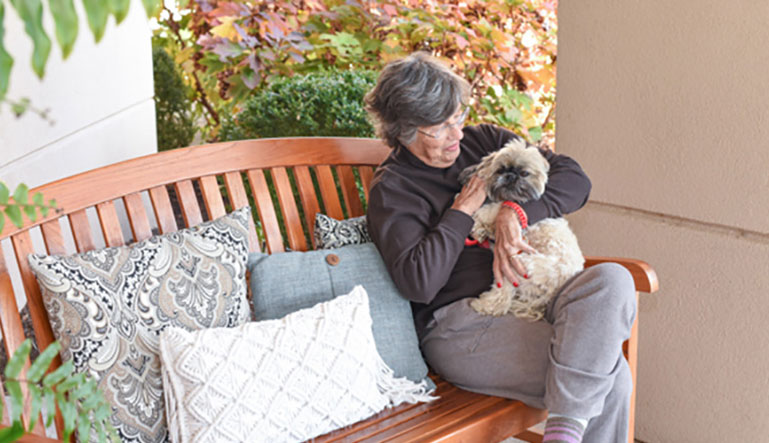Older adults with dementia will likely experience agitation and aggression at different points in their disease process. These behaviors are triggered by many factors including a change in environment, an illness or simply a bad day.
The most important issue caregivers need to understand is seniors with dementia are experiencing their own realities. In order to appease a senior’s agitation and aggression, caregivers need to tap into this reality and embrace it.
During bouts of difficult behaviors, caregivers should try a variety of methods to help their senior loved one feel comfortable.
How to Handle Difficult Behaviors When a Senior Has Alzheimer’s
Here are 10 tips for coping when an older adult with dementia exhibits difficult behaviors.
- Music
Music therapy helps seniors calm down and reflect on happier times. According to research from the Alzheimer’s Association, listening to music releases dopamine in the brain and triggers happy feelings throughout the body.
Music also improves memory function and encourages social engagement.
- Aromatherapy
According to a study in BJPsych Advances, using scents like lavender can reduce difficult behaviors in older adults with dementia.
Benefits include improved sleep, decreased agitation, higher concentration and reduced hallucinations.
- Touch
A gentle human touch can create a bond between the caregiver and the senior, resulting in a calming effect. It also helps increase trust. A soft back rub or gentle hand pat may be a way to reduce agitation in a senior loved one.
- Pet Therapy
According to Every Day Health, pet therapy has many benefits for seniors with dementia. They include decreased agitation, increased physical activity, increased appetite and joy.
- A Calm Approach
Behaviors are often determined by the senior’s first interaction with their caregiver.
As a result, caregivers need to use a calm, open approach when they initially approach their loved one. It’s also crucial to smile and use a warm tone during conversations.
Positive first impressions are imperative for handling difficult behaviors.
- Move to a Secure Memory Care Community
Moving your senior loved one into a First Star Senior Living memory care community may help decrease difficult behaviors.
Specialized communities are a great option for seniors with dementia. An expert staff keeps your loved one safe by minimizing triggers for wandering, aggression and agitation. Incorporating activities that support memory loss into residents’ daily schedules is one method of accomplishing that.
- Maintain Routines
One of the most effective methods for reducing challenging behaviors is by incorporating routine into your senior loved one’s life.
When an older adult with dementia sticks to a routine, they gain independence and feel comfortable because they know what to expect.
- Provide Reassurances
According to the Alzheimer’s Association, using calming phrases such as “You’re safe here” and ”I’m sorry that you are upset” allow your loved to feel safe.
- Check Medication Interactions
When your loved one is prescribed a new medication, check with their physician and pharmacist to ensure that it won’t create a reaction when taken with their other prescriptions.
Medication interactions may cause negative side effects and aggressive behaviors, according to the Alzheimer’s Association.
- Check for other Infections or Health Concerns
Infections such as a UTI can increase difficult behaviors in older adults with dementia.
Caregivers should always consult with their loved one’s physician if behaviors aren’t relieved through previously mentioned methods.
When your senior loved one becomes agitated, remember to practice patience while trying these methods. You will likely find one or two that will aid your efforts to comfort and calm them.

